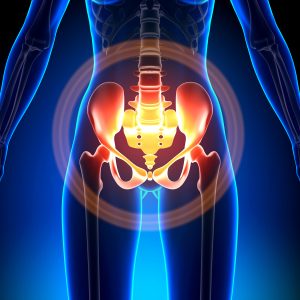
Pelvic floor dysfunction (PFD) can disguise itself in many different ways.
If you suffer from hip, groin, low back or pelvic pain, you may be dealing with pelvic floor dysfunction. PFD is a canopy term for a multitude of disorders that occur when the muscles, ligaments and soft tissues of the pelvis are impaired. This usually is due to an inability to properly control the muscles of the pelvic floor or a malalignment of the joints or structures in and around the pelvis.
The pelvic floor muscles act as a sling to hold and support the internal organs of the pelvis. Symptoms associated with PFD include pain or pressure in and around the pelvis, incontinence (bladder or bowel), dyspareunia and prolapse. PFD is most commonly caused by childbirth, pregnancy, increased intra-abdominal pressure, respiratory disorders, hypermobility, nerve damage, trauma and aging.
If you believe you have PFD, it is important to seek a professional opinion, as self-diagnosis is not recommended due to risk of misdiagnosis or infection. Examination of the pelvic structures includes laparoscopy, hysteroscopy or ultrasound.
To diagnose PFD, an internal exam usually is completed. An external exam may be done via electrodes to the musculature when available, but is less desirable due to being less accurate. To help diagnose PFD, a gynecologist, urologist, obstetrician, physical therapists or chiropractor may complete an internal examination. Treatment for PFD may include biofeedback, medications, strengthening, stretching, manual therapy, surgery and more.
Severity of the condition often will dictate the appropriate form of intervention. In less severe cases, physical therapy often is recommended to avoid invasive procedures. Physical therapy helps to regain control of the pelvic floor muscles, address malalignment, release tight muscles and provide education for self-management.
Pelvic floor physical therapists are specially trained to diagnose and treat PFD conservatively. Physical therapy treatment includes biofeedback, kegel exercises, strengthening, stretching, manual therapy, bladder/bowel retraining and more. The goal of physical therapy is to help individuals dealing with PFD return to their desired activities without pain, no longer worry about leaks, control intra-abdominal pressure and continue family planning.
Spooner Physical Therapy, in North Mesa, is located at 6824 E. Brown Road. To learn more, call (480) 924-5514, or visit spoonerpt.com/locations/north-mesa.

